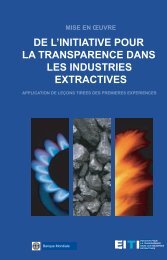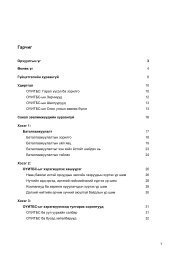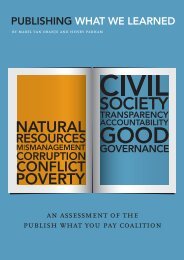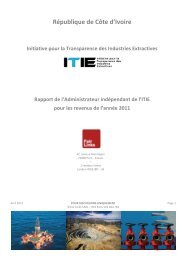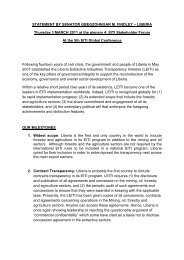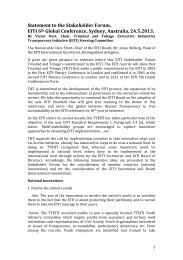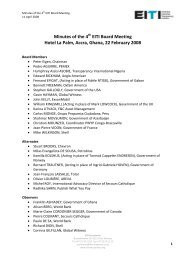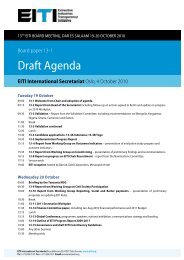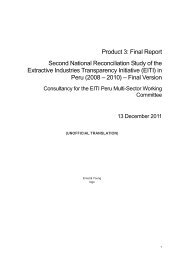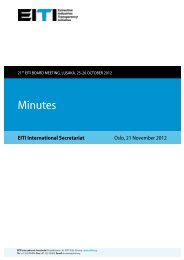Vietnam feasibility study - EITI
Vietnam feasibility study - EITI
Vietnam feasibility study - EITI
Create successful ePaper yourself
Turn your PDF publications into a flip-book with our unique Google optimized e-Paper software.
10<br />
exeCutIVe summARy<br />
<strong>Vietnam</strong> has a variety of mineral resource with over 60 types of minerals in 5000 ore deposits. Some<br />
are big reserves at the world and regional levels, such as bauxite, titanium, rare earth and limestone.<br />
Some are potential reserves, like coal with over 210 billion tons and iron with 3.5 billon tons. Some<br />
minerals have been exploited for a long time. For example, coal has been exploited for over 100 years.<br />
Oil, gas and titanium have just been exploited over the last couple of decades. In recent years, the<br />
extractive industry has grown sharply and significantly contributed to the state budget and socioeconomic<br />
development. Its contribution accounts for 9-11% of total GDP since 2000.<br />
The extractive industry of <strong>Vietnam</strong> rapidly grows in which the numbers of extractive companies increase<br />
on average by about 22 % per year. Demands on mineral resources for domestic consumption and<br />
export have been increasing in recent years and are looking to increase sharply in the coming years.<br />
The extractive industry has substantially contributed to the state budget (the oil and gas industry<br />
alone contributed about 1/3 of the state budget in recent years). The extractive industry does not<br />
only contribute to the national income, but also it brings substantial amount of foreign currency that<br />
is significant for stabilizing the national economy. By 2009, the extractive industry gained about 8.5<br />
billion USD from export. Of these, crude oil was a major commodity generating 6.2 billion USD, as<br />
well as creating a high number of jobs, assuring national energy security, and providing raw materials<br />
for almost all other industrial sectors. The role of the extractive industry continues to grow in the<br />
“industrialization and modernization” strategy of the country. Nevertheless, the extractive industry is<br />
predicted to struggle with difficulties and challenges due to a rapid exhaustion of oil and coal in the<br />
coming time. Moreover, <strong>Vietnam</strong> has some big reserve minerals at the world level, such as bauxite,<br />
titanium and limestone, but these minerals are common throughout the world and current demand is<br />
not high. Meanwhile, <strong>Vietnam</strong> either has few precious minerals, such as gold, lead and zinc that are in<br />
high demand, or lacks them altogether, such as diamonds.<br />
Throughout its development, the extractive industry has exposed many contradictions and has<br />
developed unsustainably. Illegal mineral extraction is common in many areas, resulting in a high loss<br />
of revenue for the state. Moreover, mining practices are wasteful, in which extractive companies often<br />
avoid fully exploiting or processing the minerals when they face difficulties. Therefore, the benefits<br />
of mineral resources are not maximized, resulting in a resource waste. The natural endowment is<br />
sometimes given to vested interests instead of the people due to poor monitoring and evaluation<br />
mechanisms. Mineral extraction also leaves many negative impacts to the natural environment and<br />
local communities.<br />
To assure benefits of natural resources for the development of the nation, harmoniously shared<br />
amongst the State, the Extractive Company and the People, the transparency of revenue/payment in<br />
the extractive industry is very necessary. In addition to recent efforts such as amending the Law on<br />
Minerals, which has just been approved by the National Assembly, <strong>Vietnam</strong> also needs to consider<br />
participating in the global initiatives, such as the implementation of Extractive Industries Transparency<br />
Initiative (<strong>EITI</strong>).<br />
The <strong>EITI</strong> is a volunteer coalition initiative amongst the government, companies, local civil society<br />
organizations and international organizations aiming to enhance transparency and accountability in<br />
the extractive industry. It provides a global standard for revenue transparency, comprising of two<br />
mechanisms: (i) extractive companies disclose payments made to the government and vice versa;<br />
and (ii) an independent administrative body is established to reconcile all received data, managed<br />
and operated by multiple-stakeholders. To date, there are 35 <strong>EITI</strong> implementing countries around the<br />
world. The <strong>EITI</strong> is also widely supported by extractive companies and the civil society organizations. So<br />
The Extractive Industries Transparency Initiative and the Implementation Perspective of <strong>Vietnam</strong>



